Marcia Thornton Jones's Blog, page 44
August 25, 2022
On the Starting Line (Holly Schindler)
How many times have I wished it could be this simple?

Just put your toes on the starting line, and the path is already laid out in front of you. All you have to do is follow it.
Yeah. Writing is never that easy.
But when I start something new--could be a new book, a new drafting strategy, even learning to format my own work--I've learned the best thing to do is simply this:
Pick a small task. And figure out how to do that.
Maybe that's importing a Word doc into InDesign. Maybe that's figuring out what it means to follow the "beats." Maybe that's researching brainstorming tactics. Maybe that's reading everything YA you can find to get a feel of a contemporary YA tone. Do just one task. And then do one more task after that. And another.
Before you know it, that starting line will actually be way back there, behind your shoulder.
August 23, 2022
Mad in Love with Lavender: Imagine Smack Dab in the Imagination by Dia Calhoun
My gladioli towers, that once formed three walls around my garden, have bloomed to their highest crowns and few remain. The garden where I write all summer is turning toward fall. This is a poignant time. Although the garden is still all abundance and beautiful, I feel the coming loss. The grip of mortality.
Do the bees--so mad in love with the lavender--sense this too? Or do they only drink the now, now, now? Carpe diem? Maybe bees have no imagination. They don't imagine, like I do, the looming winter when I will stand in the colorless garden among the cropped tops of perennials and mourn the summer. Maybe bees don't feel emotion. Feelings are one food of imagination.
The bees have instinct. Drink and be merry now for winter rushes toward us. Hurry, hurry, store up calories. Maybe instinct was a forerunner of imagination in humans. And I, in a haze of summer creativity, so mad in love with the book I'm writing that I feel drunk and hurried, maybe that's instinct too. The instinct of the artist is to be so possessed by her creation that the feeling-flower of her imagination is also her food.
But life is short. Winter looms. Let me relish the last gladioli towers and finish writing my book.
August 14, 2022
Small Steps Every Day -- By Jennifer Mitchell
As a teacher, getting started for me this time of year gives me both excitement and anxiety. I am excited to get my classroom set up and welcome my students back, but with those things comes a checklist a mile long. I teach at a “looping school” so this year my apprehension is a little less because I will be welcoming back my students from last year. Knowing the students and parents makes the start of a new year a little easier, but there is still a lot to accomplish before kids walk through the doors. I tend to be a list maker, and marking things off gives me satisfaction so that is where I usually start the process. Right now I have had the motivation to get my room ready (thanks to the help of my daughters) but I haven’t started the list quite yet for the other tasks ahead of me. Getting the room ready does set the tone for how I want the year to proceed, so that is always a good place for me to start mentally. After that, setting the daily schedule, and reaching out to parents (to welcome them) feels like the next right step to get me motivated for the year. Small steps lead to the bigger picture of feeling like I've been successful in getting the year started on a good note.
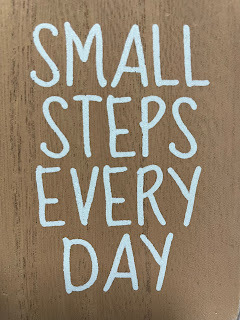
By Jennifer Mitchell 2nd/3rd grade looping teacher in the Kansas City area.
The Emotional Truth of Fiction
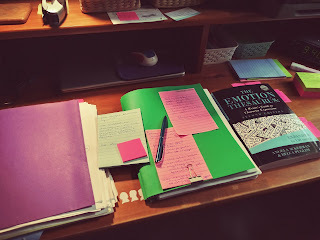
Fiction is primarily an emotional exchange.
Readers stays connected to the hero because they feel the story. Readers wants to see the character succeed, or at least wants to see what happens next, based on this connection. Because fiction is an emotional exchange, a writer chooses words to create a larger emotional impact. For example, the denotative meaning is the explicit definition as listed in a dictionary. Childhood means the state of being a child. However, the emotional weight, or the expressiveness of language, comes from the connotative meaning. The connotation of the word impacts the tone and themes of the narrative. When Dorothy says "there's no place like home," she is referring to the emotional impact of her family.
Two books I’ve revisited of late takes a deep dive into this relationship to the emotional truth of fiction.
In his book, The Emotional Craft of Fiction (Writer’s Digest Books, 2016, Donald Maass explains that human action is driven by need. “That need is sensed in subtext and revealed through what people say and do,” he states. According to Maass, the dynamics of reader responses are complex. And “the language of emotion…also makes a difference to readers’ experiences. Plot, too, can be understood as a sequence of emotional milestones.”
According to Maass, there are three paths to producing an emotional response in readers. 1. Report what characters are feeling so effectively that reader experiences the emotion. (Tell). 2. Imply the character’s inner state through external action. (Show). 3. Establish an emotional dialogue between author and reader by causing the reader to feel something that a character does not feel themselves. In my own writing, I discover the best emotional responses are often elicited when these three modes are combined.
The second book is The Emotion Thesaurus (2019), by Angela Ackerman and Becca Puglisi. As the authors explain in detail, all novels, no matter the genre, have one thing in common: emotion. “(Emotion) lies at the core of every character’s decision, action, and word…Without emotion, a character’s personal journey is pointless. Stakes cease to exist, The plot line becomes a dry riverbed of meaningless events that no reader will take the time to read.”
The challenge becomes, obviously, dramatizing these emotions in such a way as to allow the reader to experience them wholly. Experiencing a novel means “feeling immersed, rapt, caught up in the spell of the story.”
One can either read a novel, or experience it.
Writing a novel is also an emotional journey, says Maass, “akin to falling in love, living together, hating each other, separating, reconciling, gaining perspective, accepting each other, and finally finding deep and abiding love.”Here’s the truth of it: Writing is brutal work. It’s time-consuming, and exhausting. It’s wibbly wobbly in the best of times, a paradox that lives in a multiverse, a technical marvel that is bigger on the inside, and a creative force that knows no bounds.
Stories are ancient. So old, so intimately connected with language, some researchers suggest that language was created to express stories, that we are hardwired to think in story. And yet, each story is a new creation, and a new experience. At once, old and new. And every storified experience is a paradox in that it seems absolute in the moment, and yet the writing goes beyond itself, even as it never escapes itself.
This transcending power of a story lies in the emotional experience that encapsulates the universal human experience.
With a nod to Frank Sinatra:
"Throughout my career, if I have done anything, I have paid attention to every (word) and every (word) I (write) - if I respect the (story). If I cannot project this to a (reader), I fail."
--Bobbi Miller
August 12, 2022
Book Review: Cabby Potts, Duchess of Dirt by Kathleen Wilford
As you probably know, I am a hugs fan of MG historical fiction. So I was especially pleased to read an engaging debut from author Kathleen Wilford. Here is my review:
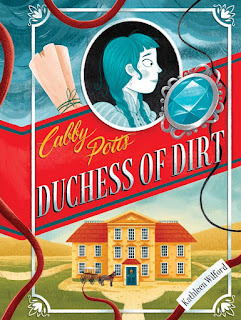 CABBY POTTS, DUCHESS OF DIRT
CABBY POTTS, DUCHESS OF DIRT This historical fiction story set in the 1870’s, is a fast-paced trip to the days of homesteading on the Kansas prairies. When her parents force her to work at grand Ashford Manor, 12-year-old Cabby Potts will do anything to escape, including playing matchmaker between her sister and the rich young lord of the manor. If it succeeds, her scheme will save her family's struggling homestead. If it fails? Cabby can’t even think about that.
Can Cabby find the courage to stand up for her family, a Native American friend, and an entire community threatened by land-grabbers?
The author does a wonderful job grounding the reader in time and place with period details and appropriate phrasing and language of the era. “My brain buzzed like it was full of gnats” is one of many similes that feels fresh and original. The characters are well-rounded and engaging, making for a quick read. Readers will enjoy Cabby’s antics and feisty demeanor as she navigates the unfamiliar world of the wealthy. A highly recommended debut.
Darlene Beck Jacobson has never homesteaded, but she has enjoyed digging up stories of the past in her historical fiction novels.
Inspiring Kids Through Science Fiction (Andrew M. Nehring)
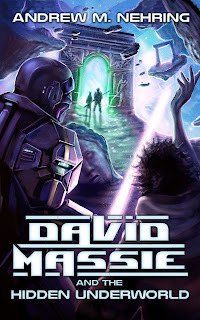
Science Fiction is a fun and exciting genre that brings the most creative responses out of both adults and children. By exposing children to reading early in life, it begins to spark that creativity that will continue until adult hood and beyond. Reading allows people to experience places, people and things that they may next experience in their everyday life. Science Fiction goes even beyond that. Science Fiction gives people ideas that are out of this world and maybe outside of the scope of what humans have accomplished thus far. However, by exposing people to science fiction, you’re allowing people to dream of things that someone might not have ever thought about and those thoughts and extraordinary inventions that these kids read about, might lead to the next advancements in human technology.
As someone who has dyslexia, growing up Science Fiction was an escape for me. In school, I struggled with reading comprehension and as a result I had hesitation towards books and reading in front of the class for fear of being laughed at for reading badly among a long list of others. Where my journey becomes unique to me, is the fact that I have auditory and photographic memory. This allowed me to memorize everything in terms of words and sentences, so when I read, I gave the impression of having solid reading skills. In reality, I had no idea what I was saying and my comprehension was so low that teachers actually believed I was faking my disability and doubting that I had dyslexia. Most of my teachers thought that I was faking it and that I was just lazy. After a lot of hard work, I was able to get my reading comprehension to that of my grade level peers, but I was still overwhelmed by the idea of reading long and daunting books. This is why I make my books the way I do. I make my books fun and non-daunting in length (150 pages or so), that are fast to read. These are exactly the books I would have reached for in my youth! This is why I think it is so important to have these types of fun, fast paced accessible books for middle schoolers to really ignite the passion for reading for them. They would read the first David Massie, finish it quickly and jump to the next installment. As a dyslexic author it is very important to me that I make books that keep kids excited about reading and to help their imagination grow, but it is also extremely important to me that I help break the stigma around dyslexia and help encourage others who are like me to follow their dreams.
~

Andrew M. Nehring is the author of David Massie as well as The Corrupted Light Chronicles. Growing up, he was always a very imaginative child who would tend to get lost in these worlds he created for himself. That passion for creativity never stopped. The concept of David Massie came to him after years of being an avid fan of science-fiction. This world that he created draws from both old and new sci-fi concepts.
Andrew has recently graduated from Northeastern Illinois University in the beautiful city of Chicago. Now that he has graduated, he is focused on expanding the worlds of David Massie and also The Corrupted Light Chronicles. For more info, visit andrewmnehring.com.
Follow Andrew M. Nehring on Twitter: @NehringAndrew
August 11, 2022
The Right Time to Start
 I used to believe, in writing a book, there’d be a green light or a starter’s pistol or my gym coach with his loud whistle—some overwhelming signal—to tell me when to put pen to paper and just...
I used to believe, in writing a book, there’d be a green light or a starter’s pistol or my gym coach with his loud whistle—some overwhelming signal—to tell me when to put pen to paper and just...Go!
Write that first line!
If I’d waited for such a sign, right now, I’d probably be heading to some office in some building at some prescribed time instead of at this desk in these workout clothes, typing at my leisure on this keyboard.
This all begs the question: How do I know when to start writing that book?
The short answer...
There will come a moment in time when the urge to type Chapter One overtakes pretty much everything else in my life.
The longer answer...
Everything start with a spark. A word. A visual. A song lyric. A joke. An emotion. An idea I cannot shake from my mind. Like an acorn in fertile ground, it germinates for a while until it sprouts with the promise of plot and setting, theme and character.
My head is that acorn, and when it fills with so many details and, especially, with the distinctive voice of my main character... when ideas are ready to shoot from my ears...
There’ll come a point when that first line, essentially, writes itself. And I become the scribe of my thoughts.
 Yes, I understand, that’s all pretty unscientific, non-specific, fully abstract woo-woo stuff, but the process is the process.
Yes, I understand, that’s all pretty unscientific, non-specific, fully abstract woo-woo stuff, but the process is the process. And the green light in my mind is undeniable.
Jody Feldman, author of The Gollywhopper Games and the new YA thriller No Way Home among others, is actively scheduling school and library visits for the coming year through How Now Booking.
August 8, 2022
STARTING A NEW PROJECT by Jane Kelley
Have you ever wondered which way to go?

My husband Lee chose the path to the right when we were hiking in Maine. Unfortunately, life's forks in the road have no helpful signs. And there are never any guideposts when one is about to begin a project.
This is too bad. I could really use some guidance now. I'm not just picking a topic––I'm choosing what I will be doing for the next two years. That's a long time when the world is changing so fast. I worry that what seems like fertile ground will shift underneath my feet. And I'll find myself in a new place. Again.

You know what I mean. We have all been uprooted by COVID. I'm fortunate. No one I know has suffered directly from the disease. But three years ago, I had just finished writing a novel about a girl whose virologist mom was infected by a novel virus. That story became a little too topical––especially since one of the scientists had deliberately manipulated that virus to make it more contagious.
So I'm trying to decide what to write about next. I know there's nothing to be gained by walking where everyone else already has. I must find my own path. Pursue my personal passions. And hey -- if I end up on the shores of Lake Michigan -- what's so bad about that?
Hmmm. Maybe a story about an ancient sea monster washing up on the beach in a storm?
JANE KELLEY is the author of many middle grade novels --- including the prescient and unpublished ISOLATION.
August 3, 2022
Get Started in Children's Poetry with a Highlights Workshop + Retreat!
Perhaps you've heard of a not-so-little thing called "verse novels." Think Kwame Alexander, Margarita Engle, Nikki Grimes, Jason Reynolds, and so many more!
Or maybe you loved Amanda Gorman's inauguration poem.
Or perhaps you remember a beloved picture book from your own childhood (or from reading to children in your life) that was written in rhyming verse.
And maybe you've wondered: what's the big deal about poetry? Can I write poetry? If so, what's possible, and where might I fit in?
Join Charles Waters and myself in-person October 8-11 for "Poetry for Kids: A World of Publishing Possibilities." In addition to our individual work, together we've written a poetry collection, a narrative poetry picture book, a rhyming poetry picture book, a verse novel, and have curated two anthologies!
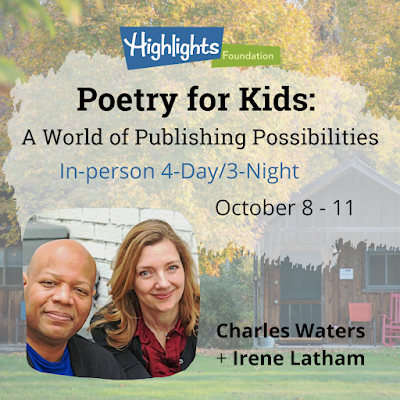
AND, this just in: Carol Hinz, Associate Publisher at Lerner Publishing for Millbrook Press and Carolrhoda Books, with whom we've worked on multiple projects, will also be joining us in person! Learn more here.
To whet your appetite, please see this post: How to Revise Poetry: 20 Questions to Ask.
Hope to see you there! 💜
August 2, 2022
New Month, New MG Books
New Month, New MG Books
It’s the beginning of August, and in the spirit of discussing things that are new, I’ve interviewed a lot of interesting middle grade authors recently about their new books on my (other) blog, Book Q&As with Deborah Kalb.
Here’s a sampling…
Amy M. O’Quinn has written a new biography for kids of Beatrix Potter, Becoming Beatrix: The Life of Beatrix Potter and the World of Peter Rabbit. She told me: “Of course, everyone remembers her as a gifted author and illustrator, but I think that people outside of the UK are also beginning to realize just what an impact Beatrix had in the conservation and preservation of the English Lake District. She has also become an acknowledged expert of mycology (years after the fact), sheep breeding, farming, etc., but I imagine the majority will still associate Beatrix mostly with her writing and illustrating talents. I’m just happy that her other pursuits and successes are being recognized and celebrated.”
On the fiction side, I interviewed several authors about their new middle grade novels, including Anna Rose Johnson, Kwame Mbalia, Yehudi Mercado, and Will Taylor.
Johnson’s new historical novel is titled The Star That Always Stays. She said that “the basis of this story was inspired by my great-grandmother’s early teen years—a girl of Ojibwe heritage navigating her mother’s divorce and remarriage at the dawn of World War I. Once I began doing genealogy research, I was fascinated by her story and felt I could use it as the plot for a middle grade novel. This was one of the most fun aspects of drafting.”
Mbalia’s new novel, The Royal Trials, is the second in the Last Gate of the Emperor series he writes with Prince Joel Makonnen. Mbalia said he hopes kids take away a “sense of adventure that the future can hold. It would be awesome if kids who might become azmari-engineers in the future read this book now. There’s also the idea that not everyone will like everything you do, and that’s perfectly fine. All you can do is continue to work towards a better tomorrow.”
Mercado’s novel, Chunky Goes to Camp, is a sequel to his novel Chunky. Mercado said: “My time at Jewish summer camp was such a special time in my childhood that I couldn't not do an entire book about it. I wanted to celebrate my friendship with Pepe and the idea of having a friend you're so connected to also have the ability to see my imaginary mascot was so fun.”
And Taylor’s novel is titled The Language of Seabirds. He said: “Seabirds really started out just vibes, as they say. The title came to me first, along with an image of a boy on a beach watching another boy run past. I knew from that it was a first-crush love story, and I set about digging into who these boys were and what each of them was hoping for.”
I also interviewed Liam Francis Walsh and Alan Gratz about their new middle grade graphic novels.
Gratz’s new book, Captain America: The Ghost Army, focuses on the Marvel superhero. Gratz said: “Cap is a living, breathing human being who actively embodies one of my favorite Maya Angelou quotes: ‘Do the best you can until you know better. Then when you know better, do better.’ I hope that's what our country is, and will continue to be.”
And Walsh’s book, Red Scare, looks back at the 1950s. “Around 2011 I was getting all sorts of old movies out from the library, and I zeroed in on the sci-fi ones from the ‘50s and watched every one I could find. I loved the way they looked, and I wondered what it would be like to remix one so it better reflected the unvarnished reality of the world in 1953: kids with polio, limited opportunities for women, soldiers returning from war with PTSD, etc.”
I hope you check out some of these books and have some fascinating new reading experiences!
--Deborah Kalb
@font-face {font-family:"Cambria Math"; panose-1:2 4 5 3 5 4 6 3 2 4; mso-font-charset:0; mso-generic-font-family:roman; mso-font-pitch:variable; mso-font-signature:3 0 0 0 1 0;}@font-face {font-family:Calibri; panose-1:2 15 5 2 2 2 4 3 2 4; mso-font-charset:0; mso-generic-font-family:swiss; mso-font-pitch:variable; mso-font-signature:-536859905 -1073732485 9 0 511 0;}p.MsoNormal, li.MsoNormal, div.MsoNormal {mso-style-unhide:no; mso-style-qformat:yes; mso-style-parent:""; margin:0in; mso-pagination:widow-orphan; font-size:16.0pt; font-family:"Times New Roman",serif; mso-fareast-font-family:Calibri; mso-fareast-theme-font:minor-latin;}.MsoChpDefault {mso-style-type:export-only; mso-default-props:yes; font-size:16.0pt; mso-ansi-font-size:16.0pt; mso-bidi-font-size:16.0pt; mso-fareast-font-family:Calibri; mso-fareast-theme-font:minor-latin;}div.WordSection1 {page:WordSection1;}



